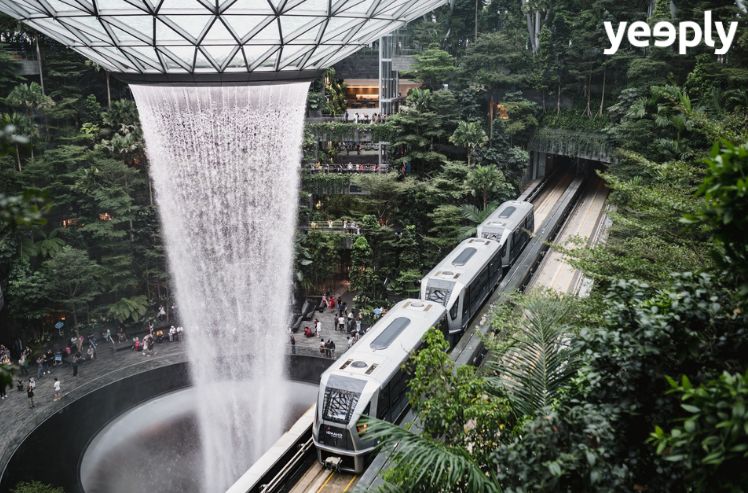Technological breakthroughs keep emerging and are transforming the way people live. It has influenced many industries as well, such as how technology benefits small businesses. It impacts every aspect of your life, so thus the city you live in today.
Many towns and cities are experiencing tremendous technological innovations in terms of mobility, security, sustainability and much more. Let’s take a look at what smart cities exactly are and the top ten of smartest cities in the world.
What are Smart Cities?
For a city to be considered smart, intelligent IoT technologies that automate infrastructure are commonly required. The government should also be able to encourage the community to be involved in advanced service management. Apps, networks, and sensors gather data on energy consumption, traffic flows and conditions, emission levels, and other issues. These data are then evaluated and used to forecast usage and trends. Having the data available to everyone by open-access programs enables individuals and enterprises to use the information for several purposes.
Related article: How you should digitise your company after Covid-19
Additionally, smart cities need leadership with a long-term vision, and citizens open to innovation. Different agencies, experts, and private companies are tracking the growth of smart cities. Accordingly, eight aspects come together that make a city smart:
- Mobility
- Healthcare
- Security
- Water
- Energy
- Engagement and Community
- Economic Development and Housing
- Waste
? How do smart cities work? Discover it in this video:
Top 10 Smartest Cities in the World
Here comes the top ten of smart cities across the globe!
#10. Hongkong
Hong Kong is one of the most influential cities in Southeast Asia. It boasts of its major porta and as a global financial centre that has earned the highest technological points, making it the world’s first in that area of technology. The city has many smart initiatives like the Hong Kong Smart City Blueprint project, with initiatives in 6 areas: mobility, living, environment, people, government and economy.
#9. Amsterdam
Amsterdam already received a lot of recognition for its smart initiatives both in Europe and the global arena. It has garnered attention for its technological advances, international outreach, and urban planning. The Amsterdam Smart City (ASC) initiative has already shown success. In one collaboration, the city partnered with local businesses and organisations to evaluate sustainable alternatives for Utrechtsestraat, the city’s largest shopping district. The ‘Climate Street‘ projects involved energy-efficient lighting, pollution reduction, and tram stops.
#8. Barcelona
This city has repeatedly been lauded for adopting smart technology. That is credited with improving the economy that collapsed in the 1980s after its textile and other factories had shrivelled.
In 2011, the city held the first Smart City Expo and World Congress to encourage a self-sufficient city with prosperous communities within a hyper-connected zero-emission major city. Spain’s second-largest city is now filled with LED light-pole sensors that monitor traffic, air quality, pedestrian activity, and noise. It can also automatically dim or switch off lights if desired.
You can also find around the city, smart bins fitted with vacuums drain garbage into underground storage. This innovation minimises foul odours and reduces the frequency of garbage truck trips. City officials can also monitor waste levels and identify where it can accumulate faster. Thus, leading to greater efficiencies. The city’s bike-sharing scheme was one of the first to minimise the number of vehicles, particularly in heavily-trafficked areas.
? Find out more about Barcelona’s smart city projects:
#7. New York
Local government officials of New York City are working hand in hand to make the Big Apple one of the smart cities. They believe to be a sustainable city that will continue to make things better for any New Yorker.
With public and private sector initiatives, the city is experiencing a digital transformation to make the government more accessible to the public, reduce costs, improve performance, and understand what is happening in New York City. The mayor’s office and local government integrate with state-of-the-art technologies to take full advantage of the Internet of Things and mobile devices’ possibilities.
#6. London
The London Public Innovation Challenge is a melting pot for startups to build solutions to a wide variety of urban challenges. It is in line with the policy plan to make public data as accessible as possible, promoting cooperation between the public, technological and academic sectors.
The city initiative, Connected London, offers 5G access to the whole city, requiring additional infrastructure to provide maximum fibre optic coverage. Officials state that 5G cells must be positioned 200 meters apart to make it stable. They use drones to locate vacant space where cellular antennas can be mounted. Another program is aimed at providing free access to Wi-Fi in government facilities as well as on the streets.
#5. Oslo
Oslo uniquely sticks out in smart cities for its focus on developing a sustainable, environmentally friendly atmosphere. Although smart cities and sustainable places are a little different, Oslo can be counted as both. The city has 650,000 LED lights, all of which are connected to a monitoring hub. These smart lights will automatically change the amount of illumination required to meet current needs.
Oslo also enables sophisticated license plate detectors to build a data-based way to avoid traffic jams. The city has hopes to rehabilitate its transportation system in the coming years altogether.
#4. Boston
The city of Boston was one of the first places to embrace smart innovations. It has opened its Innovation District at its seaport to show the public its smart initiatives. The site has then helped over 200 tech startups.
It aimed to involve its citizens by introducing a collection of apps that contain parking information, where anyone can report service issues and even allow people to communicate with each other. Citizens can also track a school bus or even report graffiti anywhere in the city’s many neighbourhoods.
Since the area is well known for its traffic conditions, its campaign also highlighted how to ease mobility around the city. A digital kiosk was established where it could provide real-time details on buses and trains. It also gives information on car-shares, bike-shares, and other related services.
?? Find out more in this video:
#3. Copenhagen
The Danish capital is heading towards smart growth, integrated with its radical environmental policies. Copenhagen Solutions Lab received an award in 2017 for a system that monitors traffic, air quality, waste management, energy use, and other items and compares operations in real-time.
It integrates parking networks, traffic signals, structures, smart metering, and charging systems for electric vehicles to help traffic in real-time. It also optimises energy usage per fuel costs, traffic flows, and weather conditions. The ability to evaluate, calculate, and measure both of these data is intended to increase service delivery output.
#2. Dubai
This city is known for its Smart Dubai 2021 program, which plans to digitalise all government services. This plan includes some 100 projects covering transport, communications, telecommunications, energy, financial services, and urban planning.
About 90 government facilities are now being digitalised and made available via the DubaiNow app. City officials estimate they will save 900 million UAE dirhams or $245 million. They also plan to remove paper transfers once the scheme is finished. According to the Road and Transit Authority, a tracking device for bus drivers using artificial intelligence has dramatically decreased traffic accidents due to fatigue.
#1. Singapore
Garnering the top spot for being the smartest city globally, Singapore is the world’s second-most densely populated city. It has recorded around 8,000 people per square kilometre. Despite the ageing population, this city is facing, its government continues to look for ways to incorporate digital advancements to raise productivity.
Singapore’s Smart Nation digitally collects information around the city that is essential in managing the city. Traffic volume data are collected and sent to appropriate agencies to come up with better services. Moreover, 95% of homes are provided with broadband access that provides essential information for personal or business reasons.
The development of Virtual Singapore leads to a dynamic 3D city model that acts as a collaborative data platform. Public and private firms are open to developing tools that can be tested further to elevate the city’s smart technology initiatives. Public housing that resides 80% of the city’s residents is continually tested for advanced innovations like water management systems and tracking systems for all the elderly.
By 2022, the city government plans to launch intelligent, energy-efficient lighting on all city streets and construct 6,000 rooftop solar panels on city buildings.
✅ Check out this video to find out more:
https://youtu.be/SPbqsCqEwfs?t=31
Final Thoughts
As technology becomes more apparent in most people’s daily lives, smart cities can turn on the digital revolution to utilise data and modern-day innovations to make better urban improvements. It can be a digital solution as it injects new technologies directly that can help improve the residents’ lives.
However, even cities that lack the ingredients to turn into smart cities can set themselves apart by proper insights, good governance, a desire to differ from conventional ways of doing things, and an unwavering dedication to addressing people’s needs.












